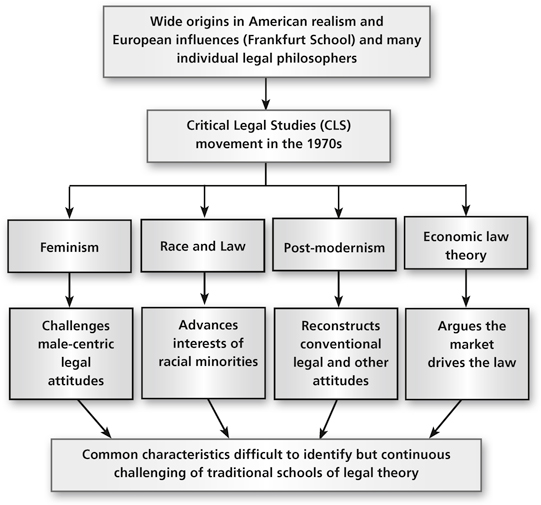Critical legal studies
Critical Legal Studies

11.1 Scope
1. In a broad context, critical legal studies (CLS) or theory can be traced back as far as the origins of natural law, in that many generations of scholars have sought to challenge the wisdom of their predecessors.
3. The modern movement originates from the 1960s although it was only formally recognised in the late 1970s.
4. Influenced by a variety of earlier European writers such as Marx and Engels, Weber and Marcuse, Gramsci, Foucault and Derrida, the focus is on:
(a) showing that law justifies and reinforces those who wield power in society
(b) consideration of the nature and extent of injustices, how they managed to become legitimated in the first place, and how once that has happened the position might be rectified
(c) emphasising the political purposes served by law and the legal system
(d) using other social science theory (e.g. economics and political philosophy) to reinforce its claims.
5. Legal realism has also either formed the subject-matter of or influenced recent legal theory such as:
 feminism (section 11.2)
feminism (section 11.2)
 critical race theory (section 11.3)
critical race theory (section 11.3)
 (postmodernism, influenced by literary theory (section 11.4)
(postmodernism, influenced by literary theory (section 11.4)
 some aspects of economic law theory (section 12.6).
some aspects of economic law theory (section 12.6).
6. It may:
(a) be referred to by other descriptions, such as ‘outsider jurisprudence’
(b) often better be characterised by differences between writers than similarities or consistency, even within the same subject areas
(c) encompass other elements of modernity such as globalisation and questions about the current or new world order in which we live.
7. Examples of the varied writers within the broad band of critical legal studies include:
 Robert W Gordon
Robert W Gordon
 Morton J Horwitz
Morton J Horwitz
 Duncan Kennedy
Duncan Kennedy
 Catharine A MacKinnon
Catharine A MacKinnon
 Roberto Mangabeira Unger.
Roberto Mangabeira Unger.
8.